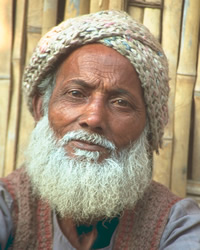South Asian, Bengali-speaking in Fiji

Photo Source:
COMIBAM / Sepal
|
Send Joshua Project a map of this people group.
|
| People Name: | South Asian, Bengali-speaking |
| Country: | Fiji |
| 10/40 Window: | No |
| Population: | 23,000 |
| World Population: | 5,981,400 |
| Primary Language: | Bengali |
| Primary Religion: | Islam |
| Christian Adherents: | 10.00 % |
| Evangelicals: | 1.00 % |
| Scripture: | Complete Bible |
| Ministry Resources: | Yes |
| Jesus Film: | Yes |
| Audio Recordings: | Yes |
| People Cluster: | South Asia Muslim - other |
| Affinity Bloc: | South Asian Peoples |
| Progress Level: |
|
Introduction / History
The Bengalis are among the original inhabitants of the Bengal region of South Asia. This territory is divided politically between Bangladesh and West Bengal, a state in India. Although the Bengalis are primarily classified by the Bengali language, their culture remains very diversified. In general, Bengalis are a proud people, highly ambitious, and always striving for excellence. For that and other reasons, Bengalis have migrated to other parts of the world to make a better living. One of these locations is Fiji, an island nation to the east of Australia. The number of South Asians (such as Bengali speakers) has dwindled in Fiji since a 1987 coup which caused many middle-class South Asians to move to other countries.
What Are Their Lives Like?
Originally coming to Fiji as indentured servants. Most Bengalis now fit into Fiji's middle class as shopkeepers and restaurant owners. Many also work in retail, trade and finance. Some professionals in medicine, science engineering and information technology.
The father is the head of the Bengali home. The mother takes care of the children and domestic responsibilities. More and more Bengali women work full-time. Parents strongly encourage their children to marry within their people group and faith. They also want their children to obtain university and professional degrees. Some Bengalis speak Bengali at home and English on the job and with their neighbors. Some Bengali families now use English at home.
Most Bengalis in Fiji are from Bangladesh. There is a Bangladesh Fiji Association (BAF) to promote Bangladeshi culture in this country. Bengalis get together for cultural events and to socialize and eat delicious South Asian food. This cultural group keeps them informed about things happening in Bangladesh.
Fijians of Bengali descent have served that island nation as athletes, actors, economists, politicians and even a prime minister.
What Are Their Beliefs?
About two-thirds of the Bengalis in Fiji are Sunni Muslims. The remainder are Hindus, some of whom have their roots in West Bengal, India.
Sunni Muslims believe that the supreme God, Allah, spoke through his prophet, Mohammed, and taught mankind how to live a righteous life through the Koran and the Hadith. To live a righteous life, you must utter the Shahada (a statement of faith), pray five times a day facing Mecca, fast from sunup to sundown during the month of Ramadan, give alms to the poor, and make a pilgrimage to Mecca if you have the means. Muslims are prohibited from drinking alcohol, eating pork, gambling, stealing, slandering and making idols. They gather for corporate prayer on Friday afternoons at a mosque, their place of worship.
The two main holidays for Sunni Muslims are Eid al Fitr, the breaking of the monthly fast and Eid al Adha, the celebration of Abraham's willingness to sacrifice his son to Allah.
Sunni religious practices are staid and simple. They believe that Allah has pre-determined our fates; they minimize free will.
In most of the Muslim world, people depend on the spirit world for their daily needs since they regard Allah as too distant. Allah may determine their eternal salvation, but the spirits determine how well we live in our daily lives. For that reason, they must appease the spirits. They often use charms and amulets to help them with spiritual forces.
What Are Their Needs?
Bengalis in Fiji are doing well financially, but they have barriers to the gospel. Fiji is largely Christian. As a small minority, Bengali Muslims want to guard their culture and religion. However, there are some Bengalis in Fiji who have made Christ their Lord.
Prayer Points
Pray for Bengali Christian believers to take the Lord to their Muslim and Hindu neighbors.
Pray for an opening of spiritual understanding among all Bengalis. Ask the Lord to lead believers and churches in Fiji to build friendships with the Bengalis. Ask the Holy Spirit to soften the hearts of the Bengalis Muslims and Hindus towards Christ so that they will be receptive to the gospel.